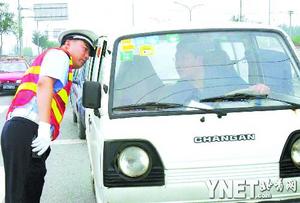Beijing has set aside 1 billion yuan (about US$140 million) to pay subsidies to owners of "Huangbiaoche" or vehicles with yellow environmental protection labels, taken off roads this year to help reduce pollution, a government official said Wednesday.
 |
|
Beijing has set aside 1 billion yuan (about US$140 million) to pay subsidies to owners of "Huangbiaoche" or vehicles with yellow environmental protection labels, taken off roads this year to help reduce pollution. |
"Huangbiaoche" are gasoline-fueled vehicles that fail to meet the National I emission standard or diesel-fueled vehicles that fail to meet the National III emission standard. Such vehicles account for about 10 percent of the 3.5 million vehicles on the road in the capital but about half the vehicle emissions, said Li Kunsheng, a director of the Beijing Municipal Environmental Protection Bureau.
He said that if 80 percent of such high-emission vehicles are taken off the road, pollution will be reduced by 300,000 tons to 400,000 tons a year.
Under municipal regulations that took effect Jan. 1, all vehicles with yellow environmental protection labels are banned from driving within the Fifth Ring Road at all times. As of Oct. 1, they will be banned within the Sixth Ring Road. The ring roads are highways that go through the downtown and suburban areas of the capital.
Chen Nan, a director of the municipal fiscal bureau, told Xinhua that her bureau had allocated 1 billion yuan to subsidize those who could show that their "Huangbiaoche" had been scrapped or transferred out of Beijing.
"The subsidy depends partly on how soon you take your vehicle off the road," said Chen.
Subsidies also vary by vehicle model and service time of the vehicle, but they start at 500 yuan and go up to 25,000 yuan.
Chen said about 844 such vehicles had been taken off Beijing's roads since the city started to offer subsidies on Jan. 12, with 1.94 million yuan paid to owners of 225 vehicles before Feb. 3.
The number of those choosing to scrap their vehicles was nearly 50 percent higher than expected, said Li. She said this was mainly because many areas outside Beijing had also implemented the National III emission standard, making it difficult to shift vehicles out of Beijing.
During last summer's Olympics, half of Beijing's 3.3 million private vehicles were taken off the road on alternate days depending on whether their license plates ended in odd or even numbers. The city recorded its lowest August pollution level in a decade.
(Xinhua News Agency February 5, 2009)